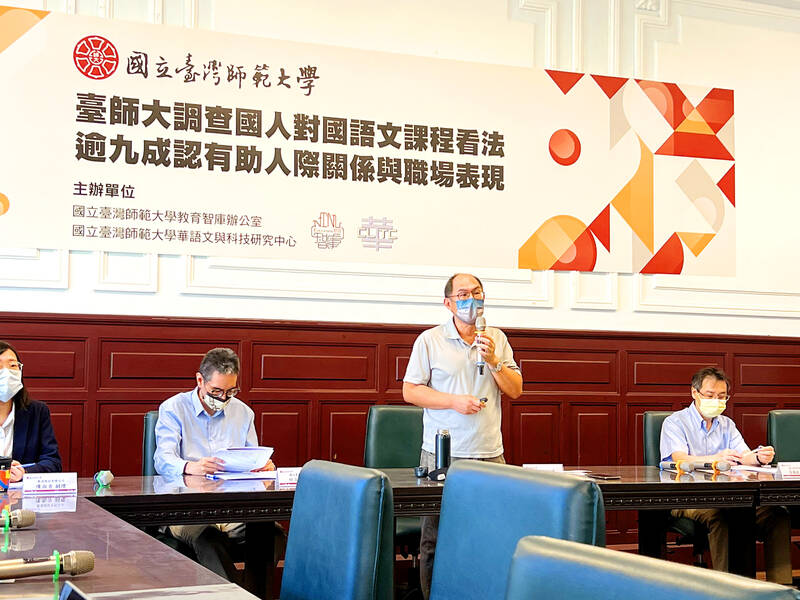More than 90 percent of Taiwanese consider learning Mandarin helpful for work and interpersonal relationships, a survey released by National Taiwan Normal University’s (NTNU) Chinese Language and Technology Center showed.
The survey, conducted on Tuesday and Wednesday, collected 1,092 valid samples from Taiwanese aged 21 to 60, the center said on Thursday.
The study also used news reports on classical Chinese education posted on Professional Technology Temple (PTT), the nation’s largest online bulletin board system, it added.

Photo: CNA
The survey was publicized after an announcement by the University Admission Committee last month that subjects of the General Scholastic Ability Test are to be included in each university department’s admission criteria.
The test consists of six subjects: Mandarin, English, category A mathematics, category B mathematics, social sciences and the sciences.
However, some universities — including a number of engineering departments at National Taiwan University — have decided to exclude applicant scores for Mandarin when considering their qualifications.
The project’s principal investigator, Chung Chung-hsien (鍾宗憲), who is also a professor at NTNU’s Department of Chinese, said on Thursday that the Mandarin language topic has generated a lot of discussion.
Mandarin courses are often criticized as being conservative, especially as electronic devices have altered the function of language and how people interact, he said, adding that opinions for and against Mandarin courses exist.
The survey found that 76 percent of respondents considered Mandarin lessons “very good” or “good”; while 82.7 percent of respondents thought that Mandarin teachers were “very good” or “good,” he said.
Furthermore, 91.7 percent, 88.5 percent and 91.8 percent of the respondents thought that Mandarin courses had a good influence on career, life planning and interpersonal relationships respectively, he said.
One of the major goals of Mandarin courses is to facilitate communication by teaching the essence of the language, he said.
Respondents over the age of 30 highly supported Mandarin lessons, indicating that teaching materials containing a large proportion of classical Chinese, familiar to people in that age group’s school curriculum, do not hinder the ability to learn and apply the language, he said.
His comment alluded to the Ministry of Education’s curriculum review committee decision in 2017 to reduce the proportion of classical Chinese content in senior-high schools to between 35 percent and 45 percent from between 45 percent and 65 percent; the change took effect in 2019.
NTNU Department of Chinese professor Hsu Kuo-neng (徐國能) said that departments can only consider scores of four subjects as their admission criteria, so a trade-off would be inevitable.
However, some departments initially decided to exclude Mandarin, but later included it back in their assessment criteria, he said.
Language education is related to students’ adaptability, competitiveness and quality of life, so should be reconsidered and adjusted, he said.

Taiwan’s Liu Ming-i, right, who also goes by the name Ray Liu, poses with a Chinese Taipei flag after winning the gold medal in the men’s physique 170cm competition at the International Fitness and Bodybuilding Federation Asian Championship in Ajman, United Arab Emirates, yesterday.

Costa Rica sent a group of intelligence officials to Taiwan for a short-term training program, the first time the Central American country has done so since the countries ended official diplomatic relations in 2007, a Costa Rican media outlet reported last week. Five officials from the Costa Rican Directorate of Intelligence and Security last month spent 23 days in Taipei undergoing a series of training sessions focused on national security, La Nacion reported on Friday, quoting unnamed sources. The Costa Rican government has not confirmed the report. The Chinese embassy in Costa Rica protested the news, saying in a statement issued the same

A year-long renovation of Taipei’s Bangka Park (艋舺公園) began yesterday, as city workers fenced off the site and cleared out belongings left by homeless residents who had been living there. Despite protests from displaced residents, a city official defended the government’s relocation efforts, saying transitional housing has been offered. The renovation of the park in Taipei’s Wanhua District (萬華), near Longshan Temple (龍山寺), began at 9am yesterday, as about 20 homeless people packed their belongings and left after being asked to move by city personnel. Among them was a 90-year-old woman surnamed Wang (王), who last week said that she had no plans

TO BE APPEALED: The environment ministry said coal reduction goals had to be reached within two months, which was against the principle of legitimate expectation The Taipei High Administrative Court on Thursday ruled in favor of the Taichung Environmental Protection Bureau in its administrative litigation against the Ministry of Environment for the rescission of a NT$18 million fine (US$609,570) imposed by the bureau on the Taichung Power Plant in 2019 for alleged excess coal power generation. The bureau in November 2019 revised what it said was a “slip of the pen” in the text of the operating permit granted to the plant — which is run by Taiwan Power Co (Taipower) — in October 2017. The permit originally read: “reduce coal use by 40 percent from Jan.